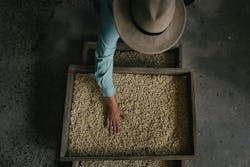Starbucks expands coffee farm investment, adds farms in Guatemala and Costa Rica
To help “protect the future of coffee,” Starbucks has invested in farms in Guatemala and Costa Rica with plans for investments in Africa and Asia. Starbucks' first company-operated coffee farm, Hacienda Alsacia, as well as these additional farms, will be used to research ways to increase coffee farm productivity, support increased profitability and build climate resilience.
Starbucks buys 3% of the world’s coffee, sourcing and roasting Arabica coffee beans. Rising temperatures that cause drought, coffee leaf rust disease and other related climate challenges are impacting the availability, quality and taste of coffee — as well as farm productivity, crop quality and the livelihoods of coffee farmers, the company noted in a release.
At Hacienda Alsacia, Starbucks is working to mitigate the impacts of climate change. The company has created best practices to make growing coffee more profitable, developed disease-resistant, quality coffee, and shared it with farmers globally. Since committing to distributing 100 million coffee trees by 2025, Starbucks has distributed approximately 90 million climate-resistant coffee trees and more than 53 million coffee seedlings to farmers.
Additional coffee innovation farms will enable research in new geographies to better mitigate the threat of climate change, the company noted. The farms in Costa Rica and Guatemala will study hybrid coffee varieties under different elevations and soil conditions. The farm in Costa Rica, located next to Hacienda Alsacia, also will be designed to explore the use of mechanization, drones and other technologies to help support labor availability challenges that farmers in Latin America are facing.
